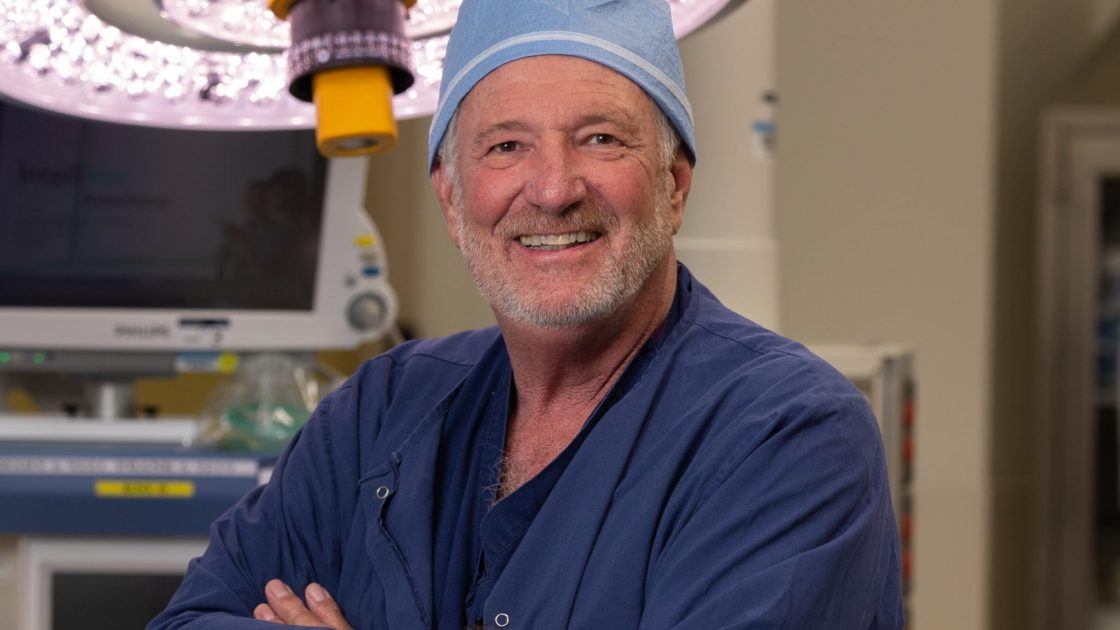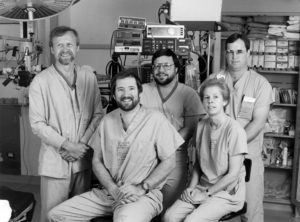
Q&A: Dr. Steven Shedd, Neuro-anesthesiologist
Dr. Spetzler helped refine the procedure, which involves cooling the body to 15 degrees, stopping the heart, and eliminating blood flow to treat aneurysms deep in the brain.
That was when Dr. Shedd realized he wanted to subspecialize in neuro-anesthesiology instead of cardiovascular anesthesiology. He enjoyed working with neurosurgeons and found cerebrovascular surgery particularly interesting. He’s been practicing neuro-anesthesia at Barrow Neurological Institute ever since.
As part of Neurosurgery Awareness Month, we spoke to him about the responsibilities, challenges, and rewards of being a neuro-anesthesiologist.
When did you realize you wanted to be an anesthesiologist?
It was sometime during my fourth year of medical school after tasting a lot of subspecialties. I think all medical students start to realize what type of personality they have. Are they a surgeon personality, are they more medicine, or somewhere in between? Anesthesia is kind of in between because we take risks, especially in neuro and especially here where we do cutting-edge stuff. We have to be able to take on something new to make an advancement that might have some real benefit in the future.
What is training like after medical school for a neuro-anesthesiologist?
The first year is an internal medicine internship, and then it’s three years of residency. Then a fellowship can be anywhere from one to two years, depending on whether or not you do research. Anesthesiologists tend to be very subspecialized.
What are the responsibilities of the anesthesiologist before, during, and after surgery?
There are a lot of things that need to be done ahead of time to make sure a patient is ready for surgery. The anesthesiologist might determine that a patient needs to see cardiology or hematology, for example. We have to make sure their other medical conditions are in the best possible state before bringing a patient to the operating room. That’s the perioperative aspect of anesthesia.
For surgery, we have to tailor the anesthetic for the patient. If we’re doing motor evoked potentials, a type of intraoperative monitoring, I’m going to do total intravenous anesthesia. We can’t use gases with motor evokes; they just don’t work. We also have to manage the patient’s other medical problems during surgery, such as high blood pressure and diabetes. We use a lot of steroids in neurosurgery, and those can wreak havoc with blood sugars. And, of course, we’re monitoring all the normal vital signs. Then at the end of surgery, we start getting the patient ready to wake back up and make sure they’re as comfortable as possible.

What’s the most difficult part of the job?
The most difficult part is staying focused on the big picture. These are long, complex cases with many moving parts. I have to be able to focus on the task at hand but keep in mind all of the other things that are going on. I’ve become very good at hearing changes on the monitors when I’m not looking at them.
What is the most rewarding part of the job?
The completion of a very successful neurosurgical procedure, where everything goes well for the whole team and the patient. And because we work in this unique location where we only see neurosurgical patients, we have an opportunity to really talk with our patients and families before surgery. Oftentimes, your anesthesiologist walks in, asks a few questions, and that’s the last you ever see of them. We have more involvement here, which makes it more satisfying. You feel like you’re part of something.
What’s one of the biggest misconceptions about anesthesiology?
Many people are afraid of anesthesia, but it’s actually extremely safe. An anesthesiologist can make a huge difference in alleviating the fears of the patients. It’s important to show confidence to the patient, but it’s also important to be a human being and sit down with the patient and listen to them. People also might not know that we have dedicated neuro-anesthesiologists here, just like we have dedicated neuroscience nurses. It’s a totally different skill set.
What advice do you have for people interested in a career in neuro-anesthesiology?
It’s a great job. It’s more work than you might think. Your hours are less predictable than maybe other types of anesthesia. You don’t always know when you’re going to go home at night, because a case might take longer than you thought. But it’s rewarding, satisfying, and challenging. This place, especially, is always going to challenge you. The young neuro-anesthesiologists here, I think a lot of them are willing to take on new challenges, learn about them, study them, innovate them, and apply them in the operating room.
But remember to do the other things in life you love to do. If there are things you don’t do with your children, you can’t get that time back. Dr. Spetzler was very good at balance and making sure the residents who trained through here saw that, and Dr. Michael Lawton is carrying that on.
This interview has been edited for brevity and clarity.
